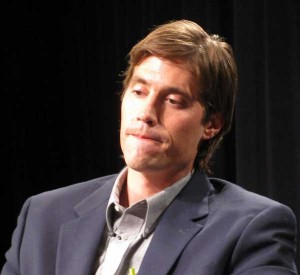His hair neatly pulled behind his ears, a bag strung around the shoulder and a sharp suit revealed few hints about his last two months. But the eyes told a different story.

James Foley speaking at Medill
An emotional James Foley, a 2008 Medill journalism graduate, recounted his 44-day ordeal in prison cells in Libya as a packed hall listened intently in Evanston on Thursday. His talk was part of the Gertrude and G.D. Crain Jr. lecture series. Tim McNulty, co-director of the Medill National Security Journalism Initiative, moderated the discussion.
Speaking just two weeks after his release, a contemplative Foley said: “Our story is a very cautionary tale. We made a lot of mistakes.”
The 37-year-old freelancer was reporting from Libya for Boston-based Global Post as rebel groups and the Libyan armed forces were engaged in an intense battle for control of key cities. Four journalists, including Foley, were shot at by Gaddafi’s troops in the frontline town of Brega. While three of them were taken captive, the fourth — South African photographer Anton Hammerl — is believed to have been killed in the gunfire.
Foley was released along with the two others on May 18 after several groups around the world pressured Libyan authorities into releasing the detained journalists. The Gaddafi government, however, refused to confirm Hammerl’s death nor has it made any comment about his whereabouts.
Reflecting on the lessons learned, Foley said: “Conflict zones can be covered safely. This can be done but you have to be very careful.”
“It’s not worth losing your life,” he said. “Not worth seeing your mother, father, brother or sister bawling.”
Foley, who was a teacher before he made the switch to journalism, said he was drawn into conflict reporting because of his brother,who works in the Air Force.
“You want to be a writer, you want to see the world,” he said. “Fiction didn’t work out too well, so [I told myself] let’s try the real thing.” Foley embedded with American troops both in Iraq and Afghanistan.
“I think it is very insightful to see where our billions of dollars are going,” he said. The embed process is an American government initiative that offers a chance for journalists to be placed with troops to be able to report better on conflicts.
But there is also a flip side. “You wonder about your objectivity sometimes,” he said. “There is always a screen separating you from the population.”
To avoid that screen, Foley said he decided not to cover the Libyan revolution from Tripoli, the capital city and government center. Instead he chose to mingle with the rebel groups as they advanced against the government forces 500 miles southeast of Tripoli.
He was shooting and editing video from the battlefront besides writing for Global Post. That’s a compulsion in today’s journalism market, Foley said. “You have got to use every multimedia platform and use it well.”
Foley was part of Medill’s Washington, D.C. program where he took the covering conflicts class, which even included a lesson on how to deal with kidnapping. He said the critical aspect to covering conflicts is to be mentally strong.
“There is a lot of loneliness and isolation,” Foley said. “You need to talk to a lot of people about the realities of this kind of stuff.”
Another crucial aspect is to be able to learn to speak the local language. “You can’t understand the conflict unless you understand the people involved in the conflict,” he said.
Despite the time spent in Libyan prisons Foley won’t shy away from reporting on conflicts.
“I told my editor I know this is crazy but I want to go back to Libya,” he said. “But emotionally I am nowhere near ready.”
The loss of a fellow journalist has made the recovery process a lot more difficult for him. “Every day I have to deal with the fact that Anton is not going to see his three kids anymore,” he said.





